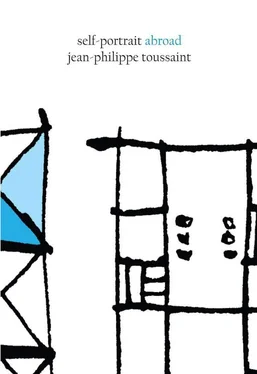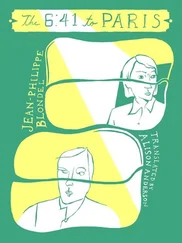Then, when it was time to leave, just before noon when almost everything had been eaten (the discussions had continued more informally, with everyone remaining seated and pecking at this or that with their chopsticks, a few spring rolls or a bit of cold meat, using the portable microphone if they had anything to add), the General Secretary of the Writers’ Union got up to take stock of our working group, welcoming at the same time the actress and singer Jane Birkin. He approached her shyly and asked her, she being a singer and all, to do us the honor of bringing our session to a close with a little song. Jane Birkin, somewhat embarrassed, kindly declined his offer, not able to dissimulate a wisp of a smile. Something from your repertoire, the General Secretary of the Writers’ Union asked her, holding out the microphone. No, no, really, repeated Jane Birkin, who continued laughing and smiling. Our other hosts joined in and started pressing Jane Birkin to sing a song. I don’t know exactly how it started, but soon everyone was pleading Jane Birkin to sing, four generations of Vietnamese writers, those who’d fought against the French, those who’d fought the Americans, everyone in the big meeting room was clapping their hands and chanting: a song! a song! We too, the French speakers, started chanting as well out of courtesy to our hosts, together with the people from the French embassy, the university professors, a few translators, and even the French ambassador, despite his sore throat. A song! a song! we all chanted around the large U-shaped conference table. Jane Birkin was laughing and laughing (and she’s got a very charming way of laughing and laughing, Jane Birkin). A song! a song! we kept chanting. Jane Birkin couldn’t refuse any longer, you can’t resist four generations of Vietnamese writers. Finally she got up and, walking briskly along the rows of chairs while pushing back a strand of hair, she took the microphone and started to sing, looking at the ministry representative:
Et quand tu as plongé dans la lagune
Nous étions tous deux tout nus…
I no longer know exactly how this strange premonition came about, but I was certain I was going to die on this trip to Tunisia. I’ve often taken the plane in recent years, but ordinarily, apart from a slight apprehension at the moment of departure, which makes itself felt by a vague pressure around the chest and a relaxation of the sphincter, giving me a sudden, if generally unwarranted, desire to take a shit the moment I call the taxi, I leave my apartment without any particular fears, even experiencing the tempered enthusiasm of a seasoned traveler as I enter the airport. To tell the story of this curious premonition from the beginning, however: Everything started, I think, one morning in Berlin, where I was living at the time, when Gilles M. of the French embassy called me up to fill me in on the schedule of my visit to Tunisia, telling me that, whereas I thought I’d be staying the entire couple of days in Tunis, I would in fact have to give a talk at the French Institute in Sfax, and asking me if I’d rather go there by car or by plane. Although the question might seem perfectly innocent, I must say that the mention of this trip to Sfax secretly had the most devastating effect on me you could imagine, because I was at once absolutely certain that it was there I would die, in the aforementioned Sfax, and that I was being asked to choose my death, as simple as that, by car or by plane, and instead of backing out by evasively citing some last-minute obstacle that prevented me from going on this trip, I demonstrated an extraordinary sang-froid by asking in an admirably neutral voice how long it takes to drive from Tunis to Sfax. Around three hours, he said. Well, do what you think is best, I said in a flat voice (when I hung up, as far as I was concerned, I was already dead).
The trip out to Tunis went without a hitch, and I was given a very cordial welcome. As nothing was planned for the day of my arrival, my host arranged to have me driven around Tunis and the surrounding area. We stopped for a moment in Carthage where there wasn’t much to see, just a sign beside a lagoon showing where the ancient Punic harbor had been (I can still see myself sitting in that car by the side of the road, the engine running, rolling down the window to take a quick look at the nonexistent ruins). After a day of historical and literary tourism with its Flaubertian and Shakespearean touch (it was a little like Elsinore in Denmark, where there’s also nothing to see), I spent a calm night before my departure for Sfax. We’d finally agreed I would travel to Sfax by car and return to Tunis by plane, so the die had not yet been cast as to the exact circumstances of my demise. The driver from the French Institute who came to pick me up at the hotel early the next morning was a small, courteous and taciturn Tunisian who helped me put my bag in the trunk of the car before we headed off slowly toward Sfax, leaving the suburbs of Tunis behind us in the haze. Sitting beside him with my seat belt fastened I daydreamed while looking out at the countryside and, aided by the heat, I even got a hard-on in the car (a small, inept erection, really, in this official car belonging to the French Institute), peacefully following the flow of my thoughts before dozing off on my seat, ithyphallic and contented. I don’t know if I conked out completely, but when I opened my eyes again I saw that we’d entered Sousse.
Good day Madam, I said, sitting up in confusion, good day Madam. It was two women, two archaeologists, one thirty-five and the other sixty, I’m making them a bit younger to be on the safe side, whose car had broken down on their way to Sfax the previous day and who, after having spent the night in Sousse, were looking for a way to drive to Sfax with their equipment and get back to their excavation, an archaeological dig situated around thirty miles south of Sfax, I’d say (I say south but I could just as well say north). Having heard through I don’t know what Arab grapevine that a speaker (that’s what they call us writers in embassy jargon) was traveling by car from Tunis to Sfax, and no doubt unaware of the fateful premonitions of said speaker, they’d asked if the driver of the French Institute’s car could take a detour through Sousse and pick them up with their gear, a complete set of six or seven suitcases full of mysterious archaeological material, big padded honeycombed metal suitcases like they use in the movies, which, stacked one on top of the other in the trunk, crushed my poor flexible black travel bag and the three impeccably ironed shirts it contained. I’d kept a low profile as the equipment was being loaded, I know it’s not a good idea to show too much of an interest when heavy lifting is being done (before you know it, you’re doing the work yourself), so I’d discreetly moved away across the parking lot while chewing on a matchstick, my hands in my pockets, my eyes on the sumptuous hotel pool that could be made out behind the tinted glass of the reception area. Then, as the four of us headed off once more towards Sfax in the comfortable French Institute car, I could see that despite the anxieties clearly visible on her face, the elder of the two women, who was having a hard time getting back her breath and wildly fanning her chest with her hand, had lost none of her good manners and erudition, because, once she’d got over the initial stress which had left her panting breathlessly beside the driver (of course I’d gallantly ceded her the death seat), she turned to me amiably and apologized for having obliged me to take this detour through Sousse. Don’t mention it, my dear woman, I said. As I too happen to be quite well mannered (though not very knowledgeable on the subject of piston rods, into whose mysteries she tried in vain to initiate me), the atmosphere soon became very refined and worldly in the French Institute’s car, and we exchanged diverse considerations on our respective activities. I asked them about the reasons for their trip, if not about the circumstances of their breakdown, and learned that, apart from the unfortunate setback of having to spend the night in Sousse and leaving their car in the hands of not particularly scrupulous mechanics who’d tried to take them for a long ride while towing their car (a big mistake, they knew the whole region like it was their own dig), it was above all the bleak prospect of spending three weeks in Sfax without a car that worried them the most. All of their hopes now rested on our chauffeur, who’d already had the chance to help them out a couple of years earlier after another breakdown in the same sector (other times, other piston rods) by driving them each morning and evening to their dig and back.
Читать дальше












